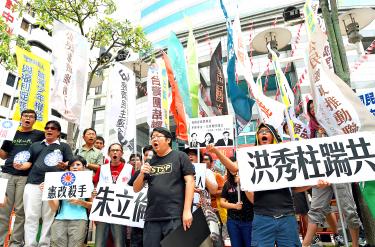As scores of activists yesterday protested outside Chinese Nationalist Party (KMT) headquarters over the legislature’s failure to pass proposed constitutional changes on Tuesday, KMT Chairman Eric Chu (朱立倫) blamed the opposition for obstructing the amendments for its own ends.
Tuesday was the last day of the legislature’s plenary session and the last opportunity for the constitutional amendment bills to pass in time for a referendum on the reforms to take place alongside the presidential and legislative elections on Jan. 16.
The legislature failed to pass the bills, with the two major parities at loggerheads over whether the amendments should be approved separately or as a package.
The Democratic Progressive Party (DPP) called for the passage of the amendments that had secured cross-party-caucus consensus, such as the lowering of the voting age and the threshold for parties to secure representation in the legislature, while leaving the contentious ones to the next stage of reform.
However, the KMT insisted that absentee voting and the legislature’s power to approve the premiership, which it says has wide public support, should be passed in tandem.
The Civil Alliance to Promote Constitutional Reform and members of several other civil groups, including the Green Party and the Social Democratic Party, yesterday gathered outside KMT headquarters to protest the party’s insistence on pushing its own constitutional proposals “for the party’s benefits, without caring about the nation’s reform.”
Some hurled eggs at the building.
The same group had staged a sit-in outside the legislature on Tuesday, demanding it pass the bills on lowering the voting age and the party threshold. After learning that cross-party negotiations in the legislature had broken down, the protesters accused the KMT of “kidnapping” the bills, saying that “the infamy of the party’s move will go down in history.”
During the rally outside KMT headquarters, where the party was holding its weekly Central Standing Committee meeting, lawyer and activist Lai Chung-chiang (賴中強) said KMT caucus whip Lai Shyh-bao (賴士葆) once said — according to media reports — that constitutional amendments “cannot include only those requested by the DPP, but also have to include those the KMT wants.”
“Is the lowering of the voting age and the party threshold not what the KMT wants? Does it mean that Chu and Deputy Legislative Speaker Hung Hsiu-chu (洪秀柱), who have both voiced their support [for the two amendments], are lying?” Lai asked.
The KMT did not directly respond to the protesters, but Chu said at the committee meeting that the proposals to empower the legislature to confirm the premier and allow absentee voting “are the two constitutional amendment proposals that have the greatest popular support and are the most significant.”
The DPP made it impossible to review and vote on the proposed amendments — including lowering the voting age and the threshold for political parties to secure legislator-at-large seats — to pursue its own interests and political motives,” Chu said.
However, DPP caucus whip Ker Chien-ming (柯建銘) on Tuesday said that, according to Lai, it was the KMT leadership’s directive to oppose the separate handling of the proposals.
The protesters said that the proposed constitutional reform had been a political tool all along and called on voters to sweep the old political forces out of the Legislative Yuan in January’s elections.
DPP Chairperson Tsai Ing-wen (蔡英文) rejected Chu’s accusations that the DPP was at fault.
“Constitutional reform does not serve the interests of a party, but that of Taiwan and the rights of its citizens, especially the younger generation. That is why we hoped to lower the voting age to 18,” Tsai said.
“Lowering the voting age and the threshold for political parties to acquire at-large seats are two proposals that different political parties and the public agree on. If we are all sincere about constitutional reform, we should first adopt those parts on which we all agree,” she said.
The KMT’s move to tie the two proposals with other more contentious proposals is regrettable, as it does not benefit the nation and deprives many of their rights, the DPP’s presidential candidate said.
Accusing the KMT of mudslinging, Tsai said: “I want to tell my rivals that they cannot stop me by trying to irritate me. I have more important things to do. I want to push for change for Taiwan and that is something that people care about.”
Tsai said the KMT has always opposed progressive values, despite its claims that it supports constitutional reform.
She said that Chu and Hung owe the public an explanation, as they had both voiced their support for lowering the voting age.
“Whether we return to power or not, the DPP will honor its promises to continue to push for constitutional reforms,” Tsai said.
Additional reporting by Loa Iok-sin
Source: Taipei Times - 2015/06/18





















